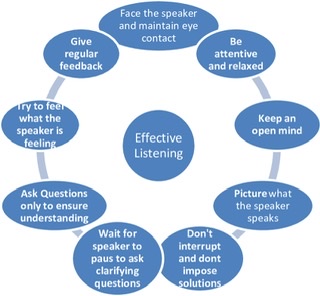
The best and most effective way to avoid conflict is to respect others and passively listen and learn different points of view.
Listening is paying attention, but it doesn’t cost much at all. Whenever a person hears what others are saying and tries to understand what they mean to say, it goes a long way. The act of listening involves complex affective, cognitive and behavioral processes.
Most people are not present in conversations. They’re too busy thinking about the next witty thing to say.
This is why you set yourself apart by listening. I mean actually listening.
Why? Because a vast amount of communication is non-verbal. You’ll surprise people by how well you read them when you truly listen.
The keys are effective listening can help you become a better person and more effective in your interpersonal relationships. It can also lead others to perceive you’re intelligent. Last but not least, effective listening can help you become a stronger public speaker.
- Listening facilitates profound introspection, self-disclosure, and social connection.
- Good listening includes the components of attention, comprehension, and positive intention.
- High-quality listening benefits both the speaker and the listener.
- To listen better, try to learn something new during the interaction.
After all, a well known American novelist, and journalist with an understated style which he termed the iceberg theory, who had a strong influence on 20th-century fiction, while his adventurous lifestyle and public image brought him admiration said.
Ernest Hemingway effectively argued, “Most people never listen.” Perhaps because of all the ingredients that make up great conversations, listening is the one we routinely take for granted.